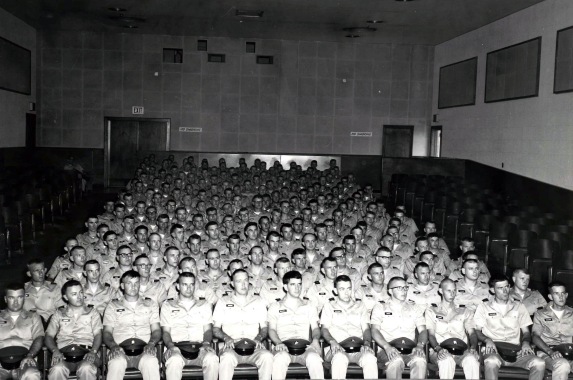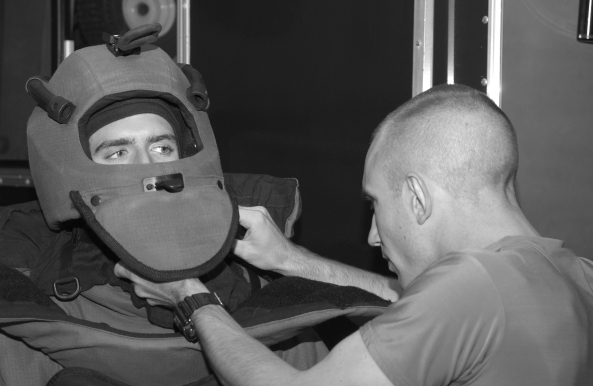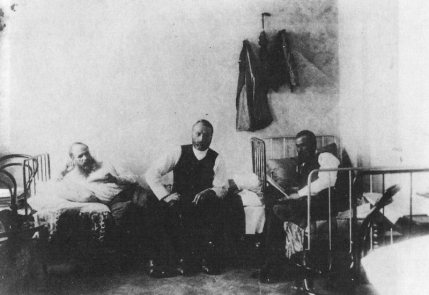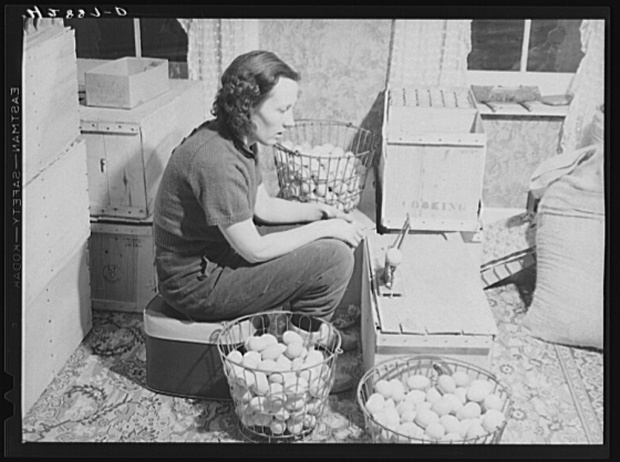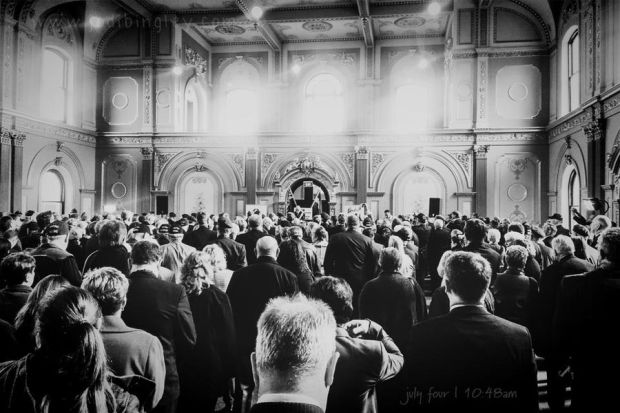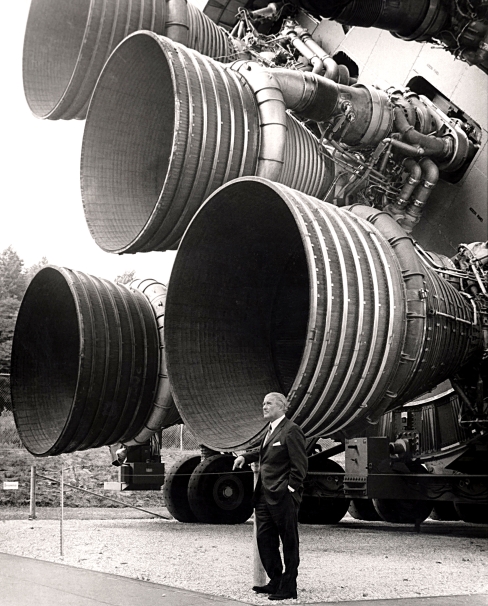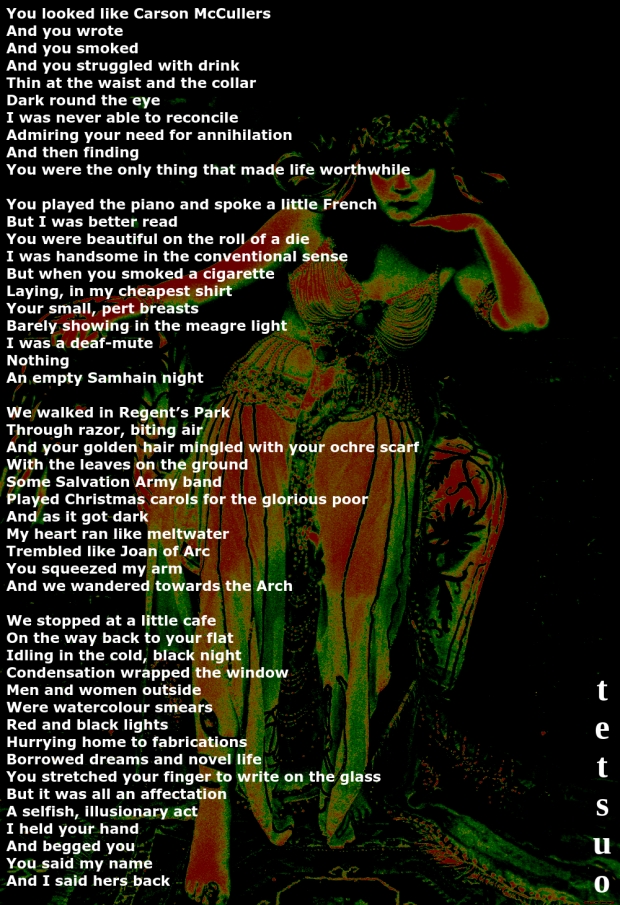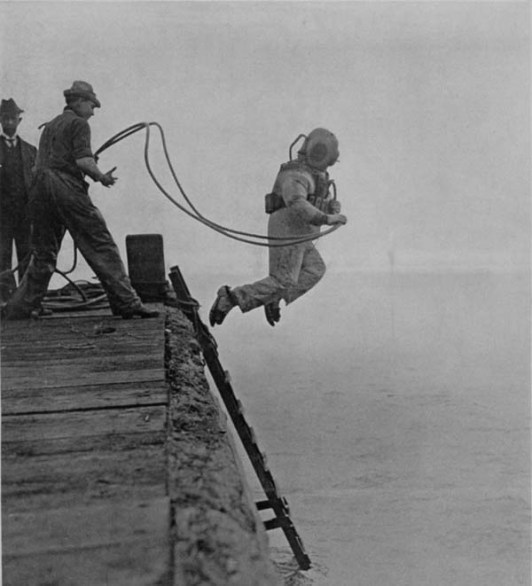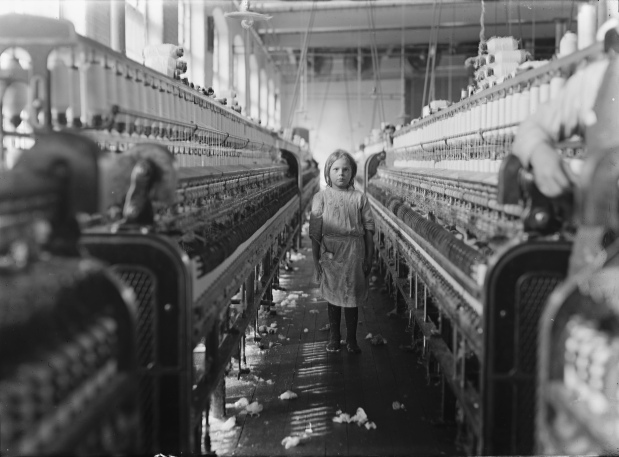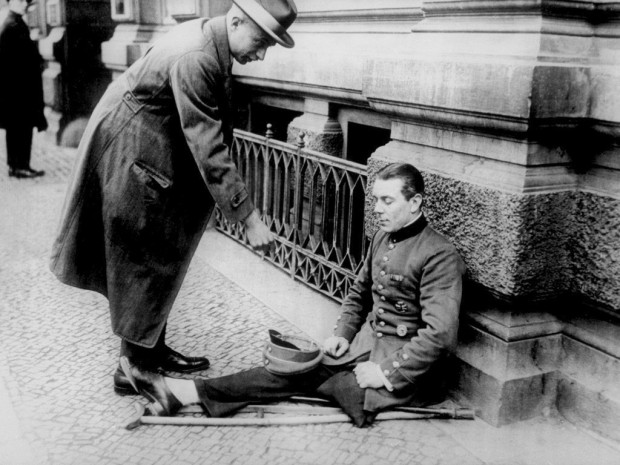
I
In the seat behind, a woman wittered into her mobile phone. Some reminiscence of how drunk she’d been and how terrible she now felt. Jennings wondered, sinisterly, what it would take to shut her up if a hangover could not. He wiped the sweating condensation from the bus window. It was Monday and the upper deck seethed with bodies, boredom and the resentment of the routine come around again. The slow trickle back into work. Water running down the windows. Five days starting their downhill charge to the gutter.
The bodies walking on the pavement below were steaming with the rain. The wind lashed lank, soaking hair into their faces and cheap umbrellas undid themselves against the gusts. The commuter crowds thickened as the bus came around the corner and started its descent into the high street. It came down between the rows of grand Georgian houses, sending spray out into the multitudes waiting at the various stops that lined the street. Jennings looked up from under the rim of the bus window at the towering buildings. The brick was a deep red, washed with the rain. The ivy that crawled across the faces of every other house was glistening and dripping sullenly.
Brass plaques affixed to the walls announced chiropractors, dentists, solicitors and surveyors. But the pavements were filthy. Plastic swam in the drains and piles of rubbish bags were stacked in the porches. On any floor above ground the dirty, bare windows allowed one to glimpse the washing drying on the horse and the unpapered walls inside. Clothes, irons and tubs of washing powder sat on the sill. There was something of the slum, still, about these buildings.
On the stop before his own Jennings began to gather his damp jacket and scarf. He glanced out of the window as the bus was pulling out. The sign next to the peeling red door that stood behind the bus stop read “Yvette St. Vincent -xxxxxgrapher”. The letters that were missing had been peeled away since long before Jennings had ever noticed them. But they fascinated him. The whole street fascinated him. Though it was just off the city centre and was filled with people waiting to catch their bus he never saw a soul step in or out of these doors. He wondered how these businesses kept up with their rent. Perhaps they were owned in full by the dentists and solicitors? Perhaps they subsisted on the rent money from the hordes of immigrant families crammed into their upper floors? But Yvette St. Vincent’s establishment took the best part of his interest. Every weekday at 8:53 he wondered, again, what field of “graphy” it was that she practiced. And then the bus peeled out and the thought was gone.
II
He sat at his desk, the damp cuffs of his trousers brushing against his calves. The computer screen in front of him was horribly bare. It pulsed with the awful whiteness of bone. His mind was fogged. He needed to write a report. He could barely get his head around what it was supposed to be showing the result of. Who cared? Did the people who commissioned it care? Some of them probably did. The ambitious and grasping idiots who strutted around the office in too-tight suit trousers and ugly shoes. The kind who spoke loudly and had nothing worthwhile to say. They would be the ones who critiqued his work. Send it back to him in a relay with all the mistakes pointed out. The ones who made him feel two inches tall because he couldn’t invest in the quality of his work or how it affected company outcomes.
The ironic thing was that he was well respected within the office. His intelligence was obvious. Everyone made mistakes in these reports, it was the natural part of the upper management to check them and send them back for revision. The ambitious and grasping may have thought him a little odd but they knew that they could rely on his ability. Some were, perhaps, even a little intimidated by his sharp mind.
It rained for three days solid. For eight hours each day Jennings sat in his damp clothes in front of the slowly amassing figures and diagrams on his screen. He loathed them, these black scratches that filled the white page. What import did they have? They would be picked through in an hour and then discarded. Like faded and forgotten names in some country graveyard. He longed to leave a mark that would endure.
On the fourth day, as the sky was beginning to clear, he walked through the office door to water pouring from the ceiling fittings.
“Jennings. Did you not get the email?”.
“Sorry?”.
One of the office managers squelched across the sodden carpet towards him.
“The whole goddamn roof came in, man. We sent out an email yesterday evening, did you not get it?”.
Jennings looked around, a little bewildered. Sunlight twinkled in the sheets of water that lay on every desk. Busy repairmen and office staff hurried, toting computers and files, here and there amongst the damage. A dim rainbow shone in the spray by the operational manager’s desk.
“No. I don’t think so” Jennings mumbled.
The office manager clapped him on the shoulder.
“Well, sorry you wasted your bus fare, but it’s full pay and sat at home for at least the rest of the week. I’ll make sure they put you on the distribution list for the updates going into next week. Not a bad way to start your Thursday, eh?”.
He squeezed Jenning’s shoulder and winked. The man’s breath was stale with cigarettes and coffee.
Jennings took the lift back to the ground floor and headed onto the street. One of the security guards nodded and waved as he passed him. The sun was out and it beamed down in blades of brilliant heat. The air was cool and refreshing as the water gathered in the gutter began to rise and evaporate. Jennings began heading to the bus stop. He slowed and then stopped and loitered outside the coffee shop on the corner. He felt strangely uplifted and elated. People hurried past, their bags and umbrellas battering against their shins. They were stragglers who had been caught in traffic or who had overslept their alarms. Perhaps this joy was only Schadenfreude, but Jennings was not in a position to count or categorize his joys. Even if it was only to sit and have a relaxed cup of coffee with no commitments to meet, he decided that he would enjoy at least a little of his freedom in town before he retreated to his flat.
Sitting by the window and watching the truly late storm past with knitted brows and panic stricken eyes, Jennings sipped his coffee and thought about the day that stretched ahead. The cafe was full of mothers meeting after dropping the kids to school and students in no hurry to get to class. Jennings went through a mental list of films he had recorded at home and weighed up which one he would sit down to at lunch and which he would watch, with dithering interest, over a bottle of wine that evening.
He liked old films. Old horror films, particularly. The older the better. It was the same thing that attracted him to the old Georgian buildings. The sad, dreamy quality of things that have fallen slightly into ruin and are buried away from the gaze of those who are not inclined to see. The horror imagery was almost incidental. It was the sweet melancholy of art gone to waste and a cast of actors, long dead, whom no-one would ever remember, that made him feel something. A queasy, creeping but unique and calming feeling.
As he drank away the last of his coffee and watched the traces of black grounds swim lazily in the dregs he decided what he was going to do with his day of freedom. He stepped out of the cafe and headed up the streets and, against the crowds, towards the row of Georgian houses. The bus that would have carried him home passed him and a bus on the same route on which he came to work idled at its stop. He stood on the porch of Yvette St. Vincent’s curious enterprise, trying to surreptitiously peer in through the window. He could make out the dim outline of furniture and nothing more. He stepped up to the peeling, crimson door.
III
There was a row of buzzers on the right of the door. On all but one the incomprehensible surnames of foreign residents were written on in rain smudged biro. He pressed in the button that remained. He heard the far off rattle of the buzzer but he got not tell from whence it issued. He waited. The streets were quiet now and he still heard the idling motor of the bus behind him. He heard feet coming down the stairs and was beginning to turn when the door was flung wide.
An Arab man stood in the doorway looking at him with a vaguely disgusted look on his face.
“Yvette St. Vincent?”.
The Arab man’s brows knitted together.
“I mean, I’m looking for Yvette St. Vincent”, Jennings said.
The man reached out and tapped the set of buzzers.
“I did. I rang the bell”, Jennings stammered.
“No. Doesn’t work. No button. This is my flat” he said, jabbing his finger towards the buzzer that Jennings had used.
“I’m very sorry. I just assumed, because the rest were unmarked, you see…”
“You have to knock”.
Jennings pictured a scene where the Arab was about to slam the door in his face and force him to knock on the door. Instead, the man stepped to one side to allow him into the hall.
It was dark and the sharp smell of chlorine mixed with the warm smell of washed clothes floated in the shadows. Jennings hung around the bottom of the stair allowing his eyes to adjust to the gloom. The man pushed past him without another word and begun to climb the stair. As he reached the point where the stairs turned he barked something in his own language to someone out of view on the landing.
Jennings was left alone in the hallway. He looked at the back of the door and considered what it was that had motivated him to come. There weren’t any answers. Some rush of passion that was fading like the blooms of coloured light before his eyes. He ground down a creeping anxiety and turned resolutely to find the door he had come here seeking.
It was all the way in the back of the hallway down the side of the staircase, enveloped entirely in the darkness. It looked like it should have been the entrance to some utility or storeroom. Only a brass plaque screwed into the wood made it stand out as anything other than that, and even the writing upon it was unreadable in the deep shadow. He began to think about what he was going to say. Began to think about walking out of the building and stepping onto the bus. His mind drifted. In the darkness and in that strange situation his mind and body seemed to slide away from one another. He thought about his warm, lonely flat. He was surprised to hear a loud banging on the door and realize that it was his hand that had floated up to the door to cause it.
There was a shuffling behind the door and he heard several locks being undone. He stepped back only a step and his back hit the stairwell. The door opened and a pale face peered out at him.
“Yes?”.
A light bulb encased in a frosted glass shade cast a warm light from behind the face looking out through the crack of the door. She had a lightly made up face and he could not place either her age or her accent. There were a few lines in the one and a a Slavic draw on the Y in the other, but he could not make a decision on either.
“Are you Ms. St. Vincent?” he asked.
“Yes?”.
And now what, he thought.
She smiled an encouraging smile at him as he fumbled with the decision.
“Are you a photographer?” he managed.
She opened the door a little more. She was wearing a long wine coloured dress that fit closely at the neck and a pair of what looked like black riding boots.
“No, I’m afraid not”, she said, “though I believe I have, still, some cards for a reputable man. I picked them up a while ago. I really ought to have that sign fixed, I suppose”.
“Oh, well, I, err…” Jennings was lost now. Entirely.
“What kind of work were you looking to have done?”.
There was a mischievous smile playing at the corner of her dry lips.
“Well, nevermind. I think he does all sorts. Would you like to come in and have a seat whilst I find the card?” she asked.
“Erm, yes, thank you”.
She stepped aside and held the door for him and, as he stepped over the threshold, he dropped his scarf. He reached down and fumbled for it on the darkened floor. As he stood up he came face to face with her. She was watching him with a strange concentration that broke back into a welcoming smile as their eyes focused on one another.
IV
He walked down a long hallway and stepped into what must have been the drawing room of the house before it had been carved up into flats. The large window through which he had tried to peer from the outside was fitted with murky glass and most of the light in the room came from the fire that crackled in a huge, ornate fireplace. The blurs of colour beyond the window were of buses and cars and people walking along the lonely street.
She came behind him down the hall, walking with a light tread. She motioned him to sit on a hard backed sofa in front of the fire and she excused herself to head behind a heavy curtain hanging across the arch at the back of the room. He looked into the snapping fire and listened to the heavy ticking of a grandfather clock. The room was decorated in a deeply period style; all brass candlesticks and bucolic watercolors that were darkened with age and faded by light. There was a smell of damp and dust in the air, mingled with a sweet undertone; familiar but just beyond the grasp of recall.
She came from behind the curtain carrying a silver tray upon which a china teapot piped thin wisps of steam into the murky air.
“Well, I’m afraid I couldn’t find his card so I shall have to offer you a cup of tea by way of apology” she smiled.
He began to stand, muttering some polite excuse.
“Sit, sit, sit. Don’t be silly, just one cup” she chided as she set the tray down on the small table in front of the sofa. Before he had had a chance to offer a counter the aromatic tea was splashing into the cup and he found himself sitting once more and watching it pour.
“There now. Milk? No? Then, sugar?”.
“Two please”.
“Perfect” and she dropped two quaint cubes into the golden tea and passed him the cup, rattling on its saucer.
She sat on the opposite corner of the sofa smoothing her dress under her. They sat in silence for an interminably long time. Jennings cursed the futile endeavor and himself for both attempting and then failing in its execution.
“I really must see if I can find those cards” she said, at last. “You wouldn’t believe how many people come looking for photographic services. I really, really must have that sign relettered”.
Jennings sipped his tea and watched her as she stared into the heart of the fire.
“What do you do, Mr…?”.
“Jennings. I’m a loss adjuster”.
“Are you really? You always hear that title. But I don’t think I have any idea what one is”.
She looked back at him dreamily.
“Loss adjuster. It sounds a little sinister when you say it out loud”.
He smiled.
“You’re not the first person to comment on it. And what do you do here, Ms. St. Vincent?”
“I’m a haemotographer” she replied.
“A haemotographer?”.
“Yes”.
She said it in a prickly and clipped manner and sipped at her tea with exactitude.
“Something to do with blood?”.
“That’s a bit reductionist, but I suppose it fits” she said.
There was a heavy silence that he did not know how to navigate. He watched her from the corner of his eye. By the light of the fire the lines in her face had melted a little and her grey hair glowed with an echo of what it might once might have been. She had obviously possessed a great beauty in her youth. It still lingered, quiet and delicate, like smoke that ghosts the air after the roaring bonfire has died.
“I’m sorry” she spoke at last, “it was my father’s profession and it’s little understood. I suppose I have inherited his defensiveness around it”.
“Was he a biologist?”.
“Of a sort” she said, turning to face him again. And now the fire that burned was in her eyes.
“But he was much more besides. A scientist. A true scientist; bold and with an appetite for discovery that overflowed the brackets of so called fields. I am a shadow compared to him. I have gone further only because I ride the momentum he created. If he were still here today…”.
“He sounds a very great man. You continue his work, then? As a haemotograper?”.
She watched him with shrewd eyes, grey like flint and only the pink threads of late age in the white and the folds in the eyelids marking them as anything but a hot blooded youth’s.
“I have never known anything else” she said quietly. “Would you care for another tea?”.
She leant and poured him a further cup. The faint smell of lavender, orange and sandalwood floated off of her wrists. Jennings felt a great calm. Acquiescing to this strange circumstance, he found, brought control and a bright sense of accomplishment.
“What does the title refer to, exactly, though?” he asked, choosing his words carefully.
She slowly buffed the nail of one little finger with that of the ring finger on her opposite hand as she considered her response.
“Do you believe in God, Mr. Jennings?” she asked. There was, again, the thick, Slavic spitting of the syllable in “God”. The capitalization being pronounced..
He winced a little internally. He had hoped for something more when he had found himself rapping on that door in the dark hall.
“No” he answered. The urge to add “I’m afraid not” was swallowed down.
“Neither do I. But, ironically, I find that it is easier to explain what I practice to those that do. We lost something when we killed him, you know? God, I mean. We scientists perhaps lost the most. And far more than we gained. A lot of the curiosity, the wonder and the curiosity of the grand, has gone out of people. They know that science can explain the world and that they only need to wait long enough for the curtain to be pulled slowly back”.
Jennings waited for her to go on. In the silence the clock was a beating insect heart twitching against the wall.
“There are universes inside us, Mr. Jennings. Not in any literal sense. I don’t believe in existence in a grain of sand. But the cellular workings within every living thing are as complex and, I suppose the word is astronomical, as any of the gears that drive the universe without. The splendour out there in the great black sea of galaxies is no more infinite than that which takes place inside our own bodies every second of each day. There is as much to discover, and to correct, in our own workings as anywhere else in existence”.
“And this was your father’s work?” he asked.
“He splintered off from the main streams of scientific thought. His ideas and the things that he discovered were in direct opposition to the accepted wisdom and he spent a long time in isolation whilst he built a case to present. Too long. Daddy feared ridicule and loathed assumption. But there was always something new to test and to validate. His discoveries came one after another. In time, the various fields of science were so far removed from what Daddy had pursued, revealed, that his work would have looked like alchemy to them”.
She sipped her tea and a sinister, knowing little smle played at the corners of her mouth
“You could show them, though?” Jennings said, “You say you’ve gone even further than him, right? You can finalize his legacy”.
She dismissed the idea away with a wave of her slender, wrinkled hand.
“I’m an old woman with no background in their institutions. Everything I learned was from acting as Daddy’s assistant. They wouldn’t give me the time of day”.
“Show me, then” he said. Unwonted calm had made him bold.
But she didn’t meet his gaze. She watched the shift of colours through the murky window over his shoulder. A muted ray of sun lit her face. She must once really have been tremendously beautiful, he thought.
“OK” she said and put down her cup.
V
She walked back each of the heavy damask curtains. Jennings watched on as a trill of electric anticipation pinballed through his nerves. But behind the curtain there was only a kitchen. She motioned him to come over as she flicked on an overhead light. He noticed a door, tucked in beside the Welsh dresser and secured with a large padlock, as he sat down at the large wooden table she invited him towards. On the table, before the seat she had placed him in, was a bizarre piece of machinery.
It was about the size of a microwave oven, all told, though this included the height and width of the copper pipes that snaked in an out of it. What appeared to be a short stack of bellows was also part of its makeup. The face of it was littered with dials housed in glass bubbles and, on the top, two chrome spheres were set at equal height atop rods wound with copper wire. He recognized many of the elements but could not name more than a few. The whole thing was like some antiquated piece of lab equipment from the days when they ran current through dead frogs and watched them spastically twitch.
She set down a tray upon which there was a syringe, gauze, a test tube and a smaller tray made of glass. Jennings looked at her.
“Some things, it is easier to show than to tell” she said, “Can you roll up your sleeve, please?”.
“I don’t…”.
“I’m going to take a small sample of blood as part of the process. Have you ever had a blood test?”.
“Erm, yes, I think once. Yes, I have”.
“Good. It’s no more than that”.
He began to unbutton his cuff as she tore the packaging from the syringe and began to fit the needle to the barrell. His hand shook a little as he fumbled with the button of his shirt. She took his wrist and brought his bare arm nearer to her. Her hands were as dry and cold as lake ice. She swabbed his arm at the crook of the elbow.
“Do you not like needles, Mr. Jennings?” she asked.
“I’m afraid not”.
“Look the other way”.
He shifted in the chair and stared into the battered grain of the locked door beside the Welsh dresser. The padlock that held its hasp to the wood was a lump of worn iron. He wondered what could need such significant protection?
She coughed and he misinterpreted it as a seemly way to let a man weak at the knees know that she was finished. He turned his head to see the needle still slid into the skin and an issue of blood still growing in the drum of the syringe. His stomach turned over on itself and his head felt like it lost five pounds of substance in an instant. He turned back to the door which now seemed to warp and bend before his eyes. He took a ragged breath.
“Just a moment more” she said in a cautious half-whisper.
“There now”.
He felt a pad of gauze pressed into his flesh.
“Give me your other hand” she said.
He did as he was instructed and turned back to face her, the chair wobbling on its legs just a little. She placed his hand on the gauze and he took over applying the pressure.
“Would you like another cup of tea?” she asked.
He shook his head delicately.
She took the test tube and began to decant the blood into it from the syringe. She screwed the test tube onto the open end of one of the copper pipes that emanated from the machine. She threw a large lever that took up almost one whole side of the thing and the machine began to thrum. The bellows started to pump like desperate, dry lungs. The table below Jenning’s elbow began to vibrate gently.
“What does it run on?” he asked, noticing that there were no wires coming from the machine.
“There’s a battery inside. My own design” she replied.
The blood in the test tube began to drain upward and into the copper piping. She reached across him and made a small correction to one of the dials. The humming of the machine and the vibration that it threw out began to ramp up in intensity. Arcs of cobalt blue electric charge began to crack and bounce between the two metal spheres on top of the body. Jennings lurched backwards. The air seemed to fill with electric charge. He watched the hair on his bare arm begin to stand up. An ear splittingly high pitched whine began to sound. The machine groaned and shook. The whine turned into a metallic scream and the veins of lightning snapped and whipped between the metal posts.
Jennings pushed back his chair in alarm. He envisioned this homemade reactor, whatever the hell it was, bursting and hurling shards of metal into his chest. He looked to Yvette. She was rapt with awe, unmoving. The reflection of the electric light flashed in her eyes as if they were sapphires in the sun. And, suddenly, the vibration and the lightning dropped out of existence. The bellows, which had been working feverishly, wheezed and died. All that remained was a hollow, sonorous moan as the blood began to flow, drop by drop, back into the test tube from which it had been drained.
There was a long silence
“We need to wait a couple of minutes” she said.
Jennings tried to swallow and found that his mouth was tacky and dry. The hair had gone down on his arm but his nerves felt as if they were twitching and dancing. He rolled down his sleeve.
“What does it do?” he asked.
“Would you follow even if I were to explain? I don’t mean to be course, but…”.
He supposed he wouldn’t. He was a sceptical man, though, and his instinct was to demand the credentials of all that was put before him, whether he knew their worth or not. He had been held back in his life, somehow, by this scepticism. Those that stand and question are often left behind as the rest go over the top. The cautious may live but they will not lead. Consideration and rationale is often mistaken for cowardice by the chaotic and feeling masses.
She watched the blood through the glass.
“That should do it” she said.
Taking the glass tray and setting it in front of him she placed the test tube next to it and then got up to switch off the light. He looked at the blood in the tube. Perhaps it was the light but he had the strangest fancy that it gave off an, almost imperceptible, blue glow. She sat down in the chair next to him and unscrewed the cap from the test tube.
“This”, she said, “is what Daddy worked to perfect all his life”.
She poured the blood into the tray. It dispersed with an exaggerated slowness. It didn’t seem to move in the way that a liquid should move. He couldn’t put his finger on it but the movement had an eerie quality. It was too uniform, somehow. As the last portion of the glass tray was covered by the glassy, shining blood the tinge of blue light that he wondered whether he had imagined became undeniable.
Veins of bright blue phosphorescence began to snake outward from the centre of the liquid. They crept across the shimmering surface of blood and began to form complex geometric patterns. Jennings hands grasped the edge of the table. The threads of light gradually began to take on recognizable form. The air was suffused with an indescribable smell, somewhere between ozone, hot metal and an animal shed. The image that appeared was an impossibly intricate scene of himself, Jennings, sat at a desk in the office. Not his desk, but that of his boss. The tiny identifying details were all visible in the seams of light that permeated the shed blood and traced the image.
He looked at Yvette, his mouth agape. She motioned him to look back towards the table.
The image was breaking up now, the blue light diffusing back into the crimson blood. But, once more, the veins of blue light pulsed and began to creep into appreciable forms. Now he saw himself sitting in a house that he did not recognize. The items that filled the room, though, were his belongings.
“What is this?” he whispered as he gazed into the pool of strange, charged fluid.
“It’s what you came here to see, is it not? This is what I do. I am a haemotographer” she replied.
“What does it mean? Is it my future?”.
“Of a sort. I don’t pretend to understand these things to their full extent, I only know the process by which we can access them. I’m like a smith forming cogs for a great watchmaker. If only Daddy were still here…”.
He felt himself overcome. Hot tears began to form and his throat felt choked. A single tear fell and splashed into the blood. He lurched with a fear of nameless consequence. But there was no reaction. For a long time the blood lay still, its previous image having dissolved. He was about to push his chair away when there was a sudden change on the glassy surface. A tiny swirling pattern appeared in the centre of the liquid. It grew in size, its whirling tendrils now stirring every inch of the surface. The smell of ozone and butchery grew in intensity, stinging his eyes. The trees of blue light flashed in stark relief. Unlike the previous images which had traced in gradually, this final graphic on the surface of the blood appeared in a split second and lasted only half as long again.
It was of a single building towering above a city skyline. It seemed familiar to him but there was something subtly off about the picture. He did not have the time to place just what that thing was. The image was made up of the same tracery of blue light as the previous visions, but in this there were two solid and opaque elements. A single window in the tower and a moon in the sky that glowed with grim intensity.
And then it was gone. The light suffused back into the liquid and the smell of gore and cold, metallic plasma hung, dying, as the only trace. Jennings let out a breath that he did not realize he had been holding. There was a pain at his temples and his jaw ached.
“What the hell just happened?” he asked.
She stood up and pulled her the material of her dress at the wrists.
“Come and sit down” she encouraged him.
He stood but stayed where he was, staring at the tray of inert blood. It was his blood. Something made him desire knowledge of what would become of it.
“What would happen if you were to put it back into the machine?” he asked.
“Come, sit, have tea” she said. But there was a look of knowing satisfaction in her eyes.
VI
By the time he was getting ready to leave the sky outside was growing dark. They had talked for hours about the machine and the ideas that underpinned it. He still hesitated to call it science. His mind vaulted between accepting what he had appreciated with his own senses and the unreality of what he had seen. Yvette had a knowledge that went far beneath the surface, but it was not total. Not enough to cement his own belief or settle the oath she felt she owed to her father. But she knew things that Jennings could tell she still kept withheld. There were times that the conversation would be subtly diverted down different paths. The desire to tease these secrets from out of the shadows had a strong pull. She walked him down the long hall and to the door.
“I don’t know what to say, Yvette. What you’re doing here, it’s earth shattering. All it would take is one person in the right position to see it… You could change the course of science”.
“And then what?” she asked.
“You go down in history? You advance the sciences? You become fabulously wealthy!?”.
“Daddy left more than enough collateral for me”.
“But, don’t you want people to know your father’s work?”.
“I suppose I suffer under the same curse that he did. The fear that they would laugh me out of the building before I had a chance to show them anything”.
“I could help” he said.
But she only smiled and opened the door.
The hallway was as black as pitch. The smells of cooking drifted in the cold air. He could hear the banging of hordes of small feet on the floorboards in the flats above. He opened the front door and stepped out into the night.
The rows of houses were like the imposing ridges of some black valley. The street was a trench of shade and flickering orange sodium. He stood at the bus stop and watched the streams of traffic and people on the high street further down the road. No one walked amongst the rows, here. It was strange; he felt no trepidation, isolated and exposed as he was. In fact, he felt indestructible. He felt rooted to the concrete, vast and immovable. His heart beat a solid, unshakable tattoo. He was aware of himself, of his strength, his ability and resolve, in a way that he could not remember having felt before. The bus came and he stepped boldly into the harsh light.
That night he dreamt. Dreams of fierce colour and emotion. In one he stood at the top of a small flight of stone steps looking down into a conservatory or greenhouse. Amongst the rows of tables and trellises a girl walked here and there, watering the plants. He took the steps slowly and the sound of his feet echoed in the glass chamber, though he could see nothing beyond the panes. It appeared to be a starless night beyond and, as he lifted his head, he saw his own reflection staring vertiginously down at him. The girl did not react as he reached the ground floor. She walked amongst the rows in her white gown, humming to herself. The conservatory was lit by shaded bulbs that hung on long cords from the beam in the ceiling and the soft, swaying light they gave off showed the girl’s thin, pale body beneath the delicate fabric.
“Can I help you water them, at all?” he asked. And in the dream the movement of his lips and the sound coming from them seemed quite disjointed and of little consequence to one another.
She only continued to float from plant to plant, all the while humming some ethereal tune, dipping her watering can at the ones she decided needed nourishing. Nonetheless, he sensed that she had heard him.
“They’re quite beautiful” he breathed, “you are very kind to come looking for them in the night when they need to be fed, and not wait ‘til morning”.
She looked in his direction but did not appear to see him. Though, perhaps a little flicker in her eye and a twitch at the corner of her mouth told him that she saw something. She went back to her flowers. He looked at the plants. The were the most vibrant crimson roses he had ever seen. Their petals were thick and tough and they seemed almost to burn with colour. The stems were a deep, dark green; the dense thorns that jutted from them were almost black. The cloying, sweet smell, undercut with the sharp ammonia of the earth, made him as dizzy as when he had caught his own inverse form staring down at him from the shadowy glass in the roof. He spoke and his tongue felt like a clot of lead in his mouth;
“Tell me; will I help you tend your roses?”.
And now she turned once more to him and this time, narrowing her eyes, she seemed to pick out his image, almost as if he were fading into view before her. She was quite unafraid and she shook her head gently, her blonde hair drifting too slowly about her shoulders.
“Then how will you ever feed them all before the dawn comes?” he said, and this time his lips did not move at all.
He came up behind her and placed his hands on her delicate shoulders. She did not react. He looked down at the flowers to which she was attending. The roses in the bed before her were as white as polished bone. At first.
As she tipped the watering can forward a fine shower of vibrant, red blood rained onto the petals, peppering them with spots of colour. He watched, his hands still on her shoulders, as the flowers were washed with crimson. The blood that fell into the soil gathered in small, black pools. He looked at the rest of the flowers in the rose garden. They, too, dripped and shone with the gore that coated them.
She turned and her pale face looked up at him. He felt her bones creak beneath the thin skin. Her eyes were like those of a puppet, black, shining and hollow. The watering can in her hand hung at her side and the light sound of the blood pattering on the tile was the only one in the winter garden. Her lips curled back revealing two savage rows of tightly bunched, thin and translucent teeth. Like the tearing fangs of something hauled up from the depths of the ocean. They seperated with a sound like the rustle of dry grass or rusted iron being manipulated. Her cold, abyssal eyes showed no emotion. She placed her hands atop his and leaned in towards him.
He had awoken bathed in cold sweat but by the time he had showered and was sat on the bus the weight of the dream had been dusted from his shoulders by the fresh sunlight of morning. He went back to Yvette’s alongside the garrulous crowds of commuters. But he was no longer fazed or afeared. He felt imperious; apart, but possessed of a singular knowledge.
VII
He visited Yvette again and again, even after the restoration had been completed in the office and he was back on a work schedule. He found the time. He began to research, under her direction, science and the relevant disciplines. As well as the modern books that she advised, (“Even a stopped clock is right twice a day”) she outlined several esoteric works on middle ages surgery and alchemy for him to read. These came into his hands only through arduous pursuit. He spent long evenings in local and tertiary libraries making notes from books too ancient to be withdrawn. He would arrive home in the early hours, his mind still piecing together the summoning of spirits, aether and the humours. But these things did fit together. It became apparent that these were not the wild fancies of a few heathen mystics and conmen, they were part of a comprehensive, though incomplete, school of natural philosophy from which science had diverted rather than evolved. He became increasingly convinced that it had been diverted along the wrong path.
He took the treatment again and again. The wonders that were laid before him as he gazed into the pulsing blood never lost their luster. They showed times, places, events and people beyond the imagination. And as the blood was galvanized by that strange engine; his own self was similarly charged. The travails of life were reduced to their appropriate size in the face of a new world that stretched far beyond the previously observed horizon. At work he had a new zeal and a sharpness of mind. The work was a trifle; a chore compared to his new vocation. He completed it in a fraction of the time afforded to him and adopted what was now available, utilizing it for further study. Nothing seemed insurmountable. He was being noticed now not only for his abilities but also his drive and resolve. Members of senior teams began to sniff around, piling on blandishments and dropping hints about bigger and more gainful roles.
But there was still something that stopped him from committing fully. A deep rooted anxiety and diffidence that stopped him just short. Even in the accumulating fervour, he lacked something that the rest of them had.
Sitting with Yvette by the guttering fire one evening he turned over an idea that had been stalking the corners of his mind.
“Did you read the book by Aquinas that I recommended?” she asked, “If it is truly straw, as he claimed, then it is a most magnificent kind…”,
She stopped and watched him.
“Are you OK?”, she enquired and placed a hand on his knee.
“Have you ever considered what might happen if we were to introduce the blood back into the host?” he said.
For a long time there was nothing said. The fire continued to smoulder and a thin smell of smoke filled the room.
“Of course I have” she said, at last.
“I’m willing to try”.
She got up without a word and began to tend to the fire.
“Daddy believed that it would be the culmination of his work. He attempted it on rats. But nothing became of it. Of course, that is how it appeared. Who can know really what effect it can have had on them?” she said, without turning.
“But they survived?”.
“Yes”.
She poked listlessly at the ash in the fireplace.
“Well then. I’m still not sure whether the blood should be still manifesting its charge or whether we should wait for it to return to its intert state…”.
She whirled round, the poker in her hand blithely pointed towards his face.
“Why? What do you hope to achieve?” she demanded.
“It’s your work, Yvette. Our work, in as much as I have played a small role in it these few months. It’s your father’s work. You said it yourself, he saw it as the culmination…”.
“And why should it be you?” she demanded, and a small rain of ash fell from the dirtied poker as her hand began to shake. “You have been my guinea pig more than anything. It is my work. My father’s work. Our work. Or is it because, really, you only want to benefit from it yourself? To profit from the gifts you think the procedure will offer?”.
“Yvette, I…”.
“No!” and with this she flung the poker into the hearth, her grey hair falling loose into her face. “You think that I have not submitted to the process as we have it now? You think you are the only explorer in those outer reaches? Listen and know, my boy, you are not the first!”.
He stared into those ferocious, rheumy eyes in silence. At last he spoke;
“What is it you saw in the blood?”.
She pushed the hair out her face and laughed. It had the dry rattle of dirt being thrown across a coffin lid. She plucked the poker from the gathering fire and thrust it back into its holder. She sat across from him on the sofa and dusted down the front of her skirt.
“The engine that I use is not the original. Everything gets smaller in time, of course. Daddy’s original was the size of a whole room. And the results were different; far more violent. Far less stable. The last time I used it was after Daddy left us. It is tempting to seek answers in powers that we do not understand, projecting onto them, in blind assumption, the ability to grant us answers. The issues of blood that were used were far greater, originally, and it somehow magnified them even beyond that. I saw it dance and boil and roll like a sea. It did not trace out images but, instead, took on their forms. The currents that ran through it were like cables, twisting it into shape and holding them there. I saw him, my father, on his knees and screaming without a sound. But it was not like an image at all. It was if he were there, sentient, tortured and soaked in my blood. My blood. I reached out to take his hand…”.
He waited for her to speak. But she only closed her eyes, a second too late to prevent a single tear from escaping and falling into her lap.
“Well, that’s that” she said at last. Jennings fumbled with his hands.
They spoke for a long time but always around the edges of meaning. Childhood, fate and ethics were skirted and generalized. For them intimacy lay always beneath ice and there was no fire to warm it and no dark in which to hide what might be brought up from beneath. Not even at an end of things.
He watched her by the light of the fire as it spat cinders into the faded carpet. The curtains were drawn tight against the chill evening air. The sounds of buses and footfall on the street outside had dwindled and died. This strange knowledge they possessed; only to be found within these four walls in the world of the living and only in pockets of black air inside a few buried and lost alchemist’s skulls in the world of the the dead, it separated them from others as surely as the rift that separates those two worlds. He felt as if they were the only two people left on Earth. And he knew that she would not deny him.
VIII
Jennings sat down at the table and rolled up his sleeve. He winced at the bruised puncture marks that stared back at him. He felt his equilibrium go and looked away, but still did not find his mind at peace. The sound of Yvette readying the engine was vague and distant as he stared into the battered grain of the door that stood beside the Welsh dresser. The lonely ticking of the grandfather clock had become a too-slow throb. He only came around to himself as she placed a hand on his shoulder.
“Are you ready?” she asked. And it was like the voice of a priest at the bars of a cell. Sorrow, resignation and selfish relief.
He placed his arm on the table and gritted his teeth.
The machine pumped like a bitter heart jerking the blood through its copper veins. The smell of ozone filled the air and the constellation of black wounds on his inner arm sang with discomfort as the hair was pulled to stand upright. He watched the machine work and so did she. They stared blankly at the workings only to avoid one another’s gaze.
She busied herself preparing the needle. The blood in the drum gave off its abnormal blue glow. He stared deep into it as the light waned. He was waiting for her to say something as she gripped his arm and positioned it. But she did not say a word. Not as she guided the needle towards his flesh and not as she threaded it into the vein. He looked away, overcome with a thick nausea. He began to speak but no noise came out. He tried to say her name but, already, his eyes were turning back in his head and he found himself sliding into the oily and absolute darkness.
He came to sprawled across the table and with his mind floating in a horrible state of dissociation. The room was pitch black. He found his lips moving and his tongue twitching in his mouth. Involuntarily he spoke her name
“Yvette… Yvette?”.
He got uneasily to to his feet and groped his way into the kitchen in search of the matches. The countertop was covered in some grainy substance that clung to his fingers. He found the matches and struck one. In the little pool of light that it cast the room seemed strangely drab and he rubbed his heavy eyes. There was complete silence and this, particularly, unnerved him in a nameless way.
He called her name again. The match guttered and died and the acrid smell made him feel more uneasy again. His nostrils flared in the dark. The damp and dusty smell of the room was gone. As was the smell of lavender that always pervaded. The smell of her. As he lit another match with an unsteady hand he caught something lying on the floor. It was the the iron padlock that held the door by the Welsh dresser. He turned the meagre light towards it and found it wide open.
He stepped hesitantly into the dark aperture. A set of stone steps lead down into a blackness that the light of a match would not penetrate. He stood there for a long time lighting match after match. He had always assumed that the door led into Yvette’s private quarters. But no person would live in a frigid cellar such as this. The walls were spotted with dark threads and spots of mould and the stairs were uneven and without a bannister.
He couldn’t reconcile why he stayed so long staring into that abyssal gloom until the sound that was growing in volume became loud enough to attract his conscious attention. And yet it was still too quiet to place. But it grew. He recognized it at last, turned and, dropping the match, ran for the door. It was the sound of some huge volume of heavy liquid sloshing back and forth across whatever unseen paving lay at the bottom of the steps.
He stumbled across the living room, banging into furniture as he went. The noise amongst the awful silence was not enough to drown out the unnatural, and still growing, sucking sound of that malicious tide which he could still hear beating inside his head. He felt his way down the hall and to the door. As he groped for the door knob he considered for one terrible second that it might not open at his command.
He pulled it open and slammed it behind him. The sound echoed in the dead dark hallway. But it was the only sound. There was no thunder of feet above or foreign voices calling them to heel. He felt his away along the staircase. The scratching of the match as it was drawn across the strip and the tiny hissing explosion as it caught set his heart racing with their clamour. But this was arrested as a further noise crept upon his shaken consciousness. On the landing above, something began to scrabble around in the dark.
He turned the weak globe of light towards the stair as the source of the noise came around the turn. It was a woman in form. Young, athletic, nude and entirely soaked in crimson, shimmering blood. But it did not move like a human. It began to skitter down the stairs like a spider or a lizard, its limbs at right angles to its body. Out of its face, huge eyes stared. Wide and white as porcelain. The pupils were huge and venomously hateful; this thing had perhaps never seen light. The staircase shook as it made its way towards him. He saw the broad pupils catch the sputtering light just before the match went out. He felt the air rush forward as a dripping hand reached toward him in the darkness. He screamed. And the creature screamed back.
IX
He pulled the door closed behind him and walked slowly out into the street. It had the shape of the world that he knew but, also, the unreality that he had expected. The rows of houses, the empty streets, the abandoned pavements; they were all covered in a thin layer of pale grey dust. There was not a single living being nor sound. He only knew he still heard by the tread of his soft footsteps. There was no scent in the air and no breeze to brush his clothes or skin. He stood in in the middle of the road and looked up at the sky. It was a roiling mass of crimson clouds. Some silent maelstrom seemed to be churning the entire atmosphere. There were occasional flashes of lighting within the banks of scarlet cloud but no thunder ever sounded. It was so quiet, so horribly quiet, that he could hear the blood pulsing in his veins.
He walked down into the city centre. He passed the cafe where he had stayed a while the morning that he had met Yvette. He looked through the huge plate windows. It was an empty room. The sign above the door had vanished. The walls and pillars and glass only remained. He looked further down the street and found the same strange emptiness outside and within each building. It was like walking along the bones of a skeleton, each thread of flesh, of life itself, had been picked clean from the world. Only the underpinning remained. He looked down the thoroughfare to the street just over. He saw his work building. It, too, was an abandoned crypt.
It was neither night nor day in this world. A huge moon glowed in the vibrant, crimson sky. It gave off a waxy blue-tinged light the colour of cold, dead skin. But the light was too bright and, almost too disturbing to properly apprehend, caused no shadows to be cast from anything on which it fell. The world was a perpetual and sterile dusk, dredged in the dust of ages. He ran a finger across a wall and rubbed the soft matter between his fingers. It was as if the sky that he had looked upon were only a veil that had been scorched and had fallen like scattered ashes.
He wondered, vaguely, what might lay inside these forsaken shells of the former world, set against that blood red sky? What atrocities of form and aberrations of orthodoxy might rock back and forth within, only waiting for a witness to rouse their natures and begin their crazed dancing? He was not afraid now. In this way he had gotten what he had wanted. He had it, the thing that had held him back for so long; the abnegation of that ultimate terror. After all; why would a man fear death when the existence that he inhabits is something so very much worse?
As he came onto the main street he saw the only sign of life (or something approaching it) towards its opposite end. Near the top of a tower block on the opposite side of the river, a light burned in a solitary window. A tiny square of eerie and pulsing blue. He walked down the middle of the wide road, his eyes never leaving the pinnacle of the tower. In that still and silent tomb he moved towards the light and, even when it began to burn his eyes and the blood began to throb in his neck, he did not let his gaze fall. The world did not breathe and the footprints that trailed behind him were like etchings in cold stone.
